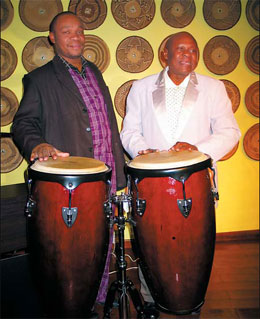Tanzanian musicians Emmanuel Mnguto and Daniel Mgunga say it's tough getting by in China without being able to speak Mandarin.
But the keyboard and percussion team of Zigua tribesmen insist they still communicate a great deal with the members of their host country.
"Music is a worldwide, international language," vocalist and percussionist Mnguto says.
The pair, who are known as The Jambo Duo - "Jambo" is a Swahili greeting - onstage, hope to tune in to the realities of a changing China while bringing their special brand of Tanzanian musicality to Beijing.
"When we perform our music onstage, the people are so happy, because they get to hear a new tune from Africa," Mnguto says. "They get to hear a new tune, a new tone and a new rhythm. It gives them morale, and they clap their hands."
The duo recalls that one Chinese audience member was so enthused by their music that he grabbed a bottle and stormed the stage during their set to insist the Duo drink wine with him.
"We could see the music moved him," Mnguto says with a laugh. "But it was hard for me to drink and play at the same time."
Although they come from the same tribe - among the more than 120 in Tanzania - Mnguto and Mgunga met in Kenya, and started performing together at five-star hotels in Nairobi in 1994.
Tanzanian duo Emmanuel Mnguto (right) and Daniel Mgunga are happy to bring African music to Chinese audiences.
It was a chance encounter with a sequel that later brought the Duo to Beijing. In 2003, they were performing at The Village Market Food Court in Nairobi, Kenya, a place known for offering international cuisines, including Chinese meals. There, a Chinese embassy staffer, who identified himself as Mr Xu, asked to snap a photo with them.
Mnguto and Mgunga didn't think anything of it until an incredible coincidence occurred four years later, when they again crossed paths with Francois Xu.
"After we finished performing that day, he asked: 'Do you remember me?' and I said: 'No, I don't remember you'," Mnguto recalls. "Then he produced the picture he took with us, and I remembered."
It was by chance that Xu had returned to visit Nairobi and had stumbled upon the Jambo Duo again with the snapshot he'd taken with the band in hand.
He asked them if they were interested in playing in China.
"We'd heard of China; we'd read about it in books, so we said, 'let's go to China and see how it is'."
Since last October, the Duo has performed in the capital's only African restaurant, Pili Pili, starting from 7:30 pm daily except Mondays.
"In Kenya, we played in the five-star hotels to earn our daily bread. When you do it in a different country, you know you are doing something better," Mnguto says.
One of the advantages of performing in Beijing, they say, is that playing for such an international crowd has expanded their repertoire.
"We do the African music, but we can't do it all around, because that would be boring. We have to check the crowd," Mnguto says.
"If we see an American in the crowd, we'll play a jazz song, like one by Nat King Cole. If we see a Spanish person in the crowd, we'll play a Spanish-sounding song; if we see an Arabian guy, we'll play something that sounds like Arabian music."
However, Chinese music has proven more challenging for them.
"We are trying to get more Chinese songs, but the language is sometimes so different, but we do our best," Mgunga says. So far, he has learned how to play Ceng Jing De Ni, a pop ballad about forlorn love by mainland heartthrob Xu Wei.
"Even though we don't understand the Chinese, we get the melody of the song, because it's a sad song, and it's tuneful like an African song," Mnguto says.
But outside of music, the band has yet to find time to do much exploring of their new surroundings. Besides a daytrip to Tian'anmen, they've spent nearly all of their free time in China rehearsing or scouring the city for venues to perform.
"So far, we're strangers here. The people here are so friendly, apart from the problem of language. They respect foreigners," Mnguto says.
But the pair agrees that upon coming to China, they found they felt less like foreigners than they had expected.
"The culture here is slightly the same (as Tanzania's)," Mnguto says. He explains that many Tanzanians are familiar with Chinese culture, because many Chinese came to their homeland to work on a railway to Zambia.
Now, the Duo hopes Chinese can come to their performances to gain exposure to Tanzanian culture.
"We hope they come to listen to our African music. It's good for the mind and will broaden you. If you have stress, come here and dance; don't only sit and listen," Mnguto says.
(China Daily January 18, 2008)


